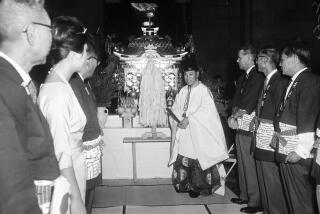Mission to Israel : Politics Gets Back Seat on Bradley Trip
- Share via
TEL AVIV — Los Angeles Mayor Tom Bradley first visited Israel as a city councilman in 1965. He returned three years later, not long before his first, unsuccessful mayoral race, and again in 1976, as an incumbent six months away from winning his second term.
Bradley arrived Saturday on his fourth visit at another important moment in his career--he is simultaneously trying to repair the damage of his run-in with his city’s Jewish community over militant Nation of Islam minister Louis Farrakhan and preparing to enter the 1986 California gubernatorial race.
In an interview, Bradley downplayed any political overtones to his trip.
“I haven’t given it any thought in that context,” he said of the visit, which was organized before Farrakhan’s appearance two months ago in Los Angeles. “Farrakhan is not an issue as far as any discussions we may have.”
Fortuitous Timing
The mayor is heading a Los Angeles business delegation sponsored by the American-Israel Chamber of Commerce. It aims to explore new opportunities for bilateral trade and investment after a recently implemented free trade agreement between the United States and Israel. The trip’s timing is fortuitous, nonetheless, providing Bradley with a highly visible opportunity to re-emphasize his longstanding good relations with Israel.
Bradley has also enjoyed overwhelming political and financial support from his city’s Jewish community during his career, and he does not want to lose it now. Yet Jewish leaders were angered in September when the mayor refused to publicly denounce Farrakhan before the militant leader’s speech in Inglewood. Bradley spoke against Farrakhan after the speech, and last week he told a convention of Jewish leaders in Los Angeles that “it may very well have been the better approach” to have denounced the militant earlier.
The Israeli press took little notice of Bradley’s troubles over the Farrakhan affair. One exception was an article in the English-language Jerusalem Post late last month, written by the newspaper’s Los Angeles correspondent, which reported that the mayor’s “former solid Jewish support is now close to rock bottom.”
Last Thursday the Post printed a letter from Bradley in reply, in which the mayor repeated his condemnation of Farrakhan and urged that his message not be allowed to “divide us.”
If political fence-mending is an inevitable part of Bradley’s visit, it goes two ways. Concerned over strains in relations between America’s blacks and Jews, Israeli officials have supported efforts by groups like the Anti-Defamation League of B’nai B’rith to limit the damage. And Bradley is scheduled to meet those top Israeli officials, including Prime Minister Shimon Peres, Foreign Minister Yitzhak Shamir, President Chaim Herzog, the ministers of defense, finance and industry, and the mayors of Tel Aviv and Jerusalem.
“He’s getting good treatment because we think he’s an important leader,” said one official who declined to be identified. While this official supported the right of the Los Angeles Jewish community to criticize Bradley’s handling of Farrakhan, he said he did not think it would cause the mayor any permanent political damage.
“I hope the understanding between him and the Jewish community will be improved,” he added.
“Israel views the black community in America as an important element in the interplay of politics and more and more in foreign relations,” said Harry Wall, director of the Anti-Defamation League’s Jerusalem office. “Israel is clearly not interested in alienating that community in America. So it is going out of its way with the Bradley visit and hundreds of others to try and convey what Israel is all about, and to do it in an honest and not a patronizing fashion.”
The league sponsored its second “Black-Jewish Mission” to Israel last month, and a group of black journalists is scheduled to be a part of another delegation in February. Israel is particularly concerned about black attitudes toward the Palestinian issue.
“Blacks have a natural tendency to identify with the underdog--namely the Palestinians,” Wall said. “We’re saying it’s not that simple.”
That is a message that Israel’s political leaders are happy to endorse.
“They’re savvy enough to understand that if you have 16 million American blacks aligning themselves with the Palestinians, that could be very dangerous to the state of Israel,” said another Israeli representative of an American Jewish group, who likewise declined to be named.
Bradley’s visit is scheduled to last through Tuesday, according to a schedule released by the Israeli foreign ministry.
More to Read
Sign up for Essential California
The most important California stories and recommendations in your inbox every morning.
You may occasionally receive promotional content from the Los Angeles Times.













